Dark Souls II: Scholar of the First Sin Xbox One Review: Return of the King
From Software raises the standard for next-gen re-releases with a thoughtful remix of their critically acclaimed 2014 RPG.
This article first appeared on USgamer, a partner publication of VG247. Some content, such as this article, has been migrated to VG247 for posterity after USgamer's closure - but it has not been edited or further vetted by the VG247 team.
Bob Mackey, Primary Reviewer, Dark Souls Veteran
Let's face facts: The promise of an "HD remaster" is rarely exciting—even if a lot of work goes into their creation. Because console games take more time and money to produce than ever before, publishers have no choice but to serve us last-gen leftovers to fill the gaps—typically giving the HD treatment to popular titles currently available at GameStop (or on Steam) for less than the price of your average burrito.
Developer From Software isn't known for delivering the expected, and Dark Souls II: Scholar of the First Sin definitely speaks to their tendency to buck trends. If you'll excuse the cliche—and I hope you do—this release can be called the Dark Souls of HD remakes; From could have easily bundled together all of Dark Souls II's existing content with some visual tweaks, and this edition still would have been worthwhile. True to their nature, they've definitely delivered more than the expected: Scholar of the First Sin essentially casts off the version of Dark Souls II you know for a Second Quest-style experience designed to confound and delight veterans of the now-vanilla version. And, speaking as someone with over 200 hours of Dark Souls II under his belt, Scholar of the First Sin definitely provides enough of a different (and improved) experience to justify yet another trip through the doomed kingdom of Drangleic.
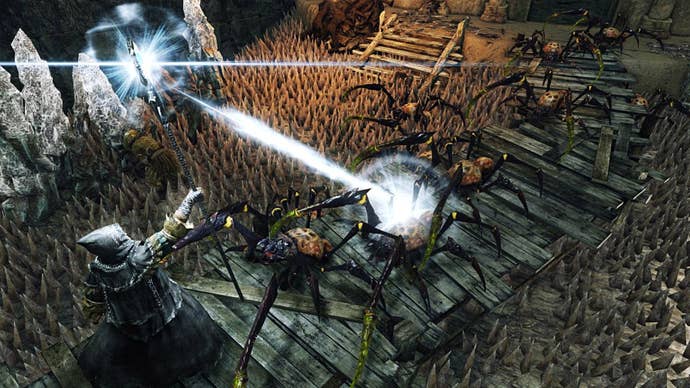
If this version of Dark Souls II has been off your radar, allow me to explain: On the PC, Xbox One, and PlayStation 4, Scholar of the First Sin collects Dark Souls II and its three DLC installments in one package. Along with the standard visual upgrades, Scholar acts as remix of the original Dark Souls II, with more (and new) foes to fight, altered enemy and item placements, and all the various tweaks included in a free patch made available for existing owners of vanilla Dark Souls II in February. The Xbox 360 and PlayStation 3 versions of Scholar only offer the original game, DLC, and patch content, as much of the remixed version is engineered to take advantage of beefier hardware. Confusing? Yes—but this is Dark Souls we're talking about.
In terms of visuals, Scholar still looks like a last-gen game, though the few improvements—especially regarding the frame rate—are definitely meaningful. If anything, this version of Dark Souls II brings the console version up to the standard of vanilla DS2's PC port, with a handful of tweaks here and there to signify its next-gen state of being. Particle effects are a lot more impressive, enemies feature details I never noticed before, and various environmental effects—from flowing water to dust motes floating through the air—look a lot more convincing. More importantly, Scholar's use of lighting falls in line with what From Software originally promised with early trailers of Dark Souls II: This time around, the torch acts as an essential item, and areas that focus on darkness are now much harder to traverse without some source of light. And though this review focuses on the Xbox One version of Scholar, I gave the PC port a spin and was happy to see all these graphical enhancements didn't cause my rapidly aging PC to hitch up for a second.
The biggest improvement in Scholar can be found in its reshuffling of the basic Dark Souls II experience, and while this edition could have easily been the console version of an uber-hard ROM hack, From didn't make their various changes haphazardly. Yes, it's definitely a tougher experience than the original; there's more enemies as a whole, making weapon durability much harder to ignore, and Scholar tends to place extremely tough foes—even clones of bosses—in places they weren't before. Even so, the various tweaks in Scholar make some sections less frustrating; I get the sense that From went over this game with a fine-tooth comb and made an effort to remove any elements that didn't fall under their tough-but-fair philosophy. One bonfire (Dark Souls' standard checkpoint), for instance, used to have four archers that would open fire immediately upon you warping in; now, there's only one. Honestly, there's too many examples to note here, but I couldn't help but be impressed by how this thoughtful remixing improved an experience I already loved.
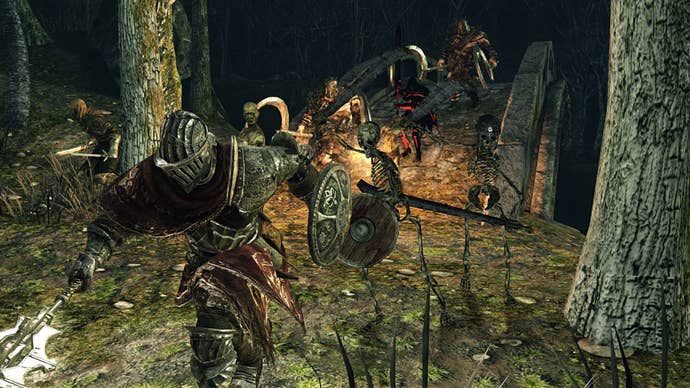
Dark Souls II's DLC felt like a response to criticism of the core game, and Scholar takes the exact same approach. This version of the game definitely ups the difficulty; enemies can now sense you from a good distance away, and will follow much further before being yanked back by their AI leash. And, even if you're playing offline, the Kingdom of Drangleic has a lot more life to it, with new NPC helpers that feel more like real players, and new NPC invaders who surprise you at the worst possible times. Dark Souls II's world feels a lot more open this time around, too, as a very early merchant now sells a key item that opens up a set of areas you'd typically have to wait much longer to access. Other key items now pop up in different places just to change the flow of the game; I assumed I'd hit a dead-end, only to realize the formerly alternate route had since been promoted to the main one. Little changes like these constantly kept me on my toes, bringing some much-needed life to an experience I'd mined so thoroughly throughout 2014.
Scholar also brings some upgrades to multiplayer; now, you can summon up to five co-op partners instead of three, though you shouldn't expect to hit this new cap anytime soon. In this immediate post-release period, summon signs—used to pull people into your game—usually faded after a few seconds, and, at best, my party rarely included more than two other people. And, sadly, I never got a chance to see how Scholar changed the invasion mechanic, as I've seen various screenshots that imply that it's now possible to square off against more than one invader. Still, teaming up with more people than the Dark Souls standard doesn't necessarily make Scholar any easier—even with three other players at my side, those tricky bosses remained just as tricky.
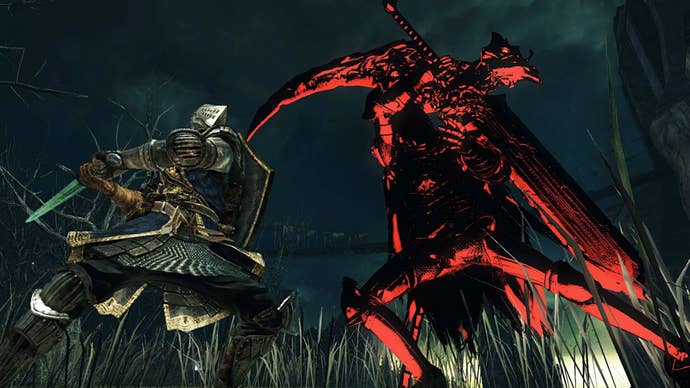
It's a bit strange that the original version of Dark Souls II isn't anywhere to be found in Scholar—rendering extant strategy guides and Wikis mostly useless—but, seeing as it would fragment the user base even further, it's an omission I'm willing to forgive. I didn't think I'd be ready to take on Dark Souls II again, but Scholar provided more than enough of an incentive for yet another playthrough; an impressive feat, especially after having invested so much time into Bloodborne. And even if you've never played vanilla Dark Souls II, there's an incredible amount of content to digest here, and in a format that feels like a real improvement over the original. Regardless of its last-gen roots, Scholar of the First Sin makes for one of the best RPGs this generation has to offer; and if you've ignored Dark Souls II until now, you're in for a real treat.
Mike Williams, Second Opinion, Dark Souls Neophyte
I've long compared playing games to learning a language. There's mechanics and ideas that come easy to players who've been exposed to a series or franchise before. If you've played Dark Souls, then Dark Souls 2 is an expansion of that specific language. You understand concepts like souls and hollowing, you get how bonfires and leveling up works; for you, it's matter of seeing how the sequel has deviated and grown from the core you understand. Even in the case of this HD re-release, Scholar of the First Sin, things have changed, but not enough to leave you completely in the dark.
I on the other hand, am starting fresh. Well, not completely: I played the spiritual predecessor of Dark Souls, the King's Field games, long ago. I purchased Demon's Souls on launch, making it to the Tower Knight before moving on to something else. It wasn't bad, but there were games ahead of it I enjoyed more. I bought Dark Souls, but the difficuly curve felt much higher and again, I had other things to play. I bought Dark Souls 2, but never touched it. Which brings us to Dark Souls 2: Scholar of the First Sin and my first real attempt to understand what all the hubbub is about.
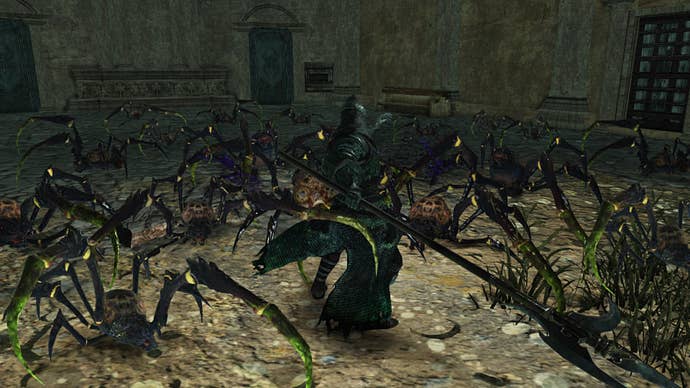
Suffering, as far as I can tell. Self-flagellation and prostration before a dark and unforgiving god. Dark Souls 2 tells you nothing. It leaves you with a wide-open world and tells you to go explore it. "The night is dark and full of terrors" indeed. One early example for me was a large Cyclops at the beginning of the game, one I rammed my head into many times, assuming that it was guarding my way forward. I heard that Dark Souls 2 was hard, so I assumed my deaths were just a part of the "git gud" feel. Nope, I was just going the wrong way.
Or perhaps there's the fact that I got a decent ways into the game without understanding how to level up. There's an NPC who helps you with that specific mechanic, but you'll not realize that until you speak to her a few times. I talked to her once and left on my merry way, assuming she was just another cryptic lost soul. After I left Majula, I went to Heide's Tower of Flame and threw my body against those rocky, sharp cliffs of death for an hour before deciding "Hurm, maybe I'm not supposed to be here." It was another long while before I found a more appropriate area. There's so much to learn about the systems of Dark Souls 2 that going guideless, as I tried to do, is foolish. The game will teach you the controls and little else. You will die, be prepared for it.
Of course, each death - and there were many for me - actually makes the game harder for you by lowering your overall health and depleting your stored stash of souls. (Thank god there's a cap.) Dark Souls is a game that punishes you hard for failure. It's unforgiving. You'll run out of Stamina and not be able to dodge. Your weapons will break. Combat is meant to be slow and methodical (I'm told Bloodborne is probably more my speed); if you try to rush an encounter, you'll probably end up dying. There's no markers or waypoints, no clear "use this item to move forward" delineations. Dark Souls 2 is completely trial-and-error.

These are features, not bugs. They are deliberate design choices meant to evoke a certain feel. Dark Souls 2 isn't for everyone. It is not a game I would've played normally, but this year I've been devoting myself to mvoing beyond the games I know and love.
Despite what sounds like dissatisfaction, there were glimmers of understanding. Moments where I see what all the fuss is about. More than most games, Dark Souls 2 is very good at establishing a sense of place. In fact, if you turn off the random notes on the ground, you almost feel like you're there in Drangleic, trudging through forgotten forests and lost catacombs. Some of the sights in this game are awe-inspiring. Walking into Majula for the first time and seeing the sun cresting over the horizon. The Roman-esque architecture of the Heide's Tower of Flame and the French style of the Lost Bastille. The haunting glow of the Black Gulch or quiet fog of the Shaded Woods. Without some of the more game-y elements like waypoints, these areas feel like real places lost to time instead of just levels.
And there is that sense of triumph when you finally overcome challenges. I don't think I ever got to the point where the game became easy, but certain enemies were far less taxing the tenth or twentieth time around. You will feel yourself getting better. Moving faster. Finishing off a boss feels like a legitimate release of anxiety and stress. I understand now why people throw their time and digital bodies at Souls games, even if it's not something I want to do on a regular basis.
Am I a complete convert? No, but I get it now. I've spent enough time that I appreciate where Dark Souls 2 succeeds. I understand what others crave from it and games like it. Some people see a mountain and they make it their aim to climb it. Dark Souls 2 is for those people and for them it's fulfilling in a way other games can't match. It's not for everyone, but what is really?
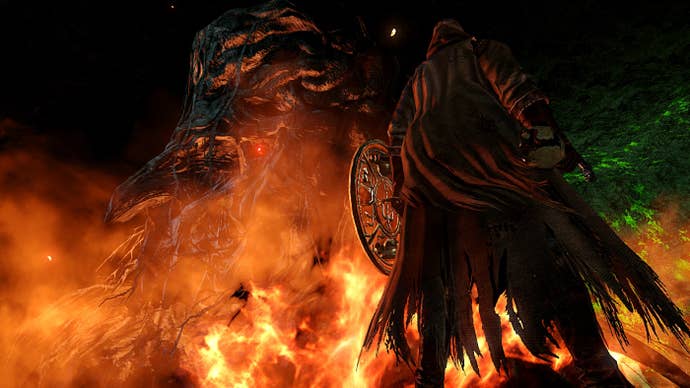
VisualsWhile not up to current-gen standards, Scholar's graphics definitely make for an improvement over the original's, offering an improved frame rate and some tweaked effects.
SoundSame as it ever was, for the most part. Dark Souls II's sound design remains just as good in this refurbished edition.
InterfaceA few tweaks here and there make the essential Dark Souls II experience a bit more intuitive than it was before.
Lasting AppealWith the core campaign and all three DLC installments, there's a LOT of game here; if this is your first time, don't be surprised if it takes 100 hours to reach the very end. And if you're a returning player, the various changes justify yet another playthrough of this once-familiar experience.
ConclusionFrom Software once raised the bar for game design; now, they've done the same for HD remakes. Rest assured, this isn't just a lazy repackaging of old content. Even if you know the Kingdom of Drangleic like the back of your hand, you're in for many new surprises. And if you've never played Dark Souls II before, your patience has paid off: This is simply the best version of it you'll ever play.
